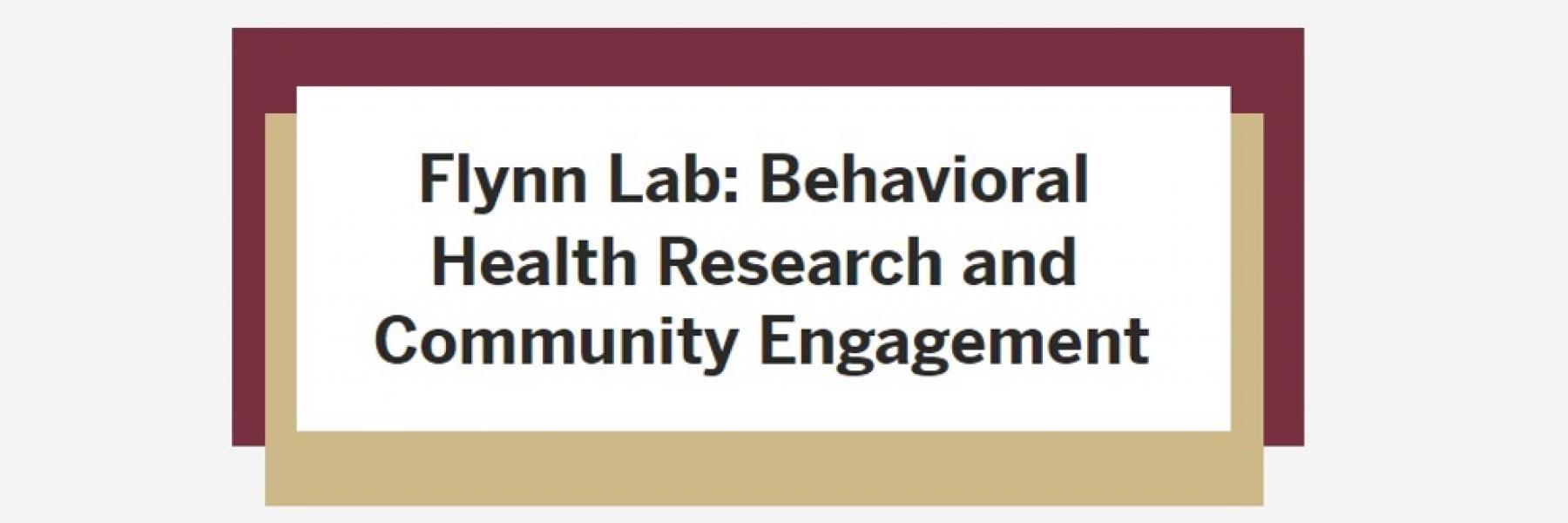About Us
 Heather A. Flynn, Ph.D. is a clinical psychologist, Professor and Chair at the Florida State University (FSU), College of Medicine in the Department of Behavioral Sciences and Social Medicine. She is the Director of the FSU Center for Behavioral Health Integration. Dr. Flynn’s research is focused on improved identification and treatment of behavioral health disorders in women, especially around the time of childbearing. Her studies are specifically aimed at developing and testing psychotherapeutic treatments for depression and co-occurring behavioral risk issues in medical and community settings. Dr. Flynn is also conducting projects focused on advancing the field both nationally and in the State of Florida through facilitating collaborative research networks to enhance synergy among experts in depression and related chronic illnesses. She is the Co-Chair of the Florida Maternal Mental Health Collaborative (www.flmomsmatter.org), and the Chair of the Women & Mood Disorders Task Group within the National Network of Depression Centers (www.nndc.org). Dr. Flynn is a member of the Motivational Interviewing Network of Trainers (MINT) and has been conducting training and supervision in MI with various settings and professionals for over 15 years. She is also a trainer and supervisor in other behavioral interventions such as Interpersonal Psychotherapy for Depression and serves on the Executive Board of the International Society for Interpersonal Psychotherapy.
Heather A. Flynn, Ph.D. is a clinical psychologist, Professor and Chair at the Florida State University (FSU), College of Medicine in the Department of Behavioral Sciences and Social Medicine. She is the Director of the FSU Center for Behavioral Health Integration. Dr. Flynn’s research is focused on improved identification and treatment of behavioral health disorders in women, especially around the time of childbearing. Her studies are specifically aimed at developing and testing psychotherapeutic treatments for depression and co-occurring behavioral risk issues in medical and community settings. Dr. Flynn is also conducting projects focused on advancing the field both nationally and in the State of Florida through facilitating collaborative research networks to enhance synergy among experts in depression and related chronic illnesses. She is the Co-Chair of the Florida Maternal Mental Health Collaborative (www.flmomsmatter.org), and the Chair of the Women & Mood Disorders Task Group within the National Network of Depression Centers (www.nndc.org). Dr. Flynn is a member of the Motivational Interviewing Network of Trainers (MINT) and has been conducting training and supervision in MI with various settings and professionals for over 15 years. She is also a trainer and supervisor in other behavioral interventions such as Interpersonal Psychotherapy for Depression and serves on the Executive Board of the International Society for Interpersonal Psychotherapy.
 Jasmine Max is a Research Associate and manager of the undergraduate DIS student program in the Flynn Lab within the Department of Behavioral Sciences and Social Medicine at the Florida State University College of Medicine. In this role, she supports student training and project coordination and contributes to the lab’s behavioral health research and community-engaged initiatives spanning perinatal and pediatric populations. On the pre-med track, Jasmine’s primary interests focus on improving maternal health outcomes, particularly through advancing perinatal mental health screening, access to evidence-based care, and equitable systems of support for pregnant and postpartum individuals. She is currently pursuing a Bachelor of Science in Exercise Physiology at Florida State University.
Jasmine Max is a Research Associate and manager of the undergraduate DIS student program in the Flynn Lab within the Department of Behavioral Sciences and Social Medicine at the Florida State University College of Medicine. In this role, she supports student training and project coordination and contributes to the lab’s behavioral health research and community-engaged initiatives spanning perinatal and pediatric populations. On the pre-med track, Jasmine’s primary interests focus on improving maternal health outcomes, particularly through advancing perinatal mental health screening, access to evidence-based care, and equitable systems of support for pregnant and postpartum individuals. She is currently pursuing a Bachelor of Science in Exercise Physiology at Florida State University.

Monica Ragans is a Project Manager for the Center for Behavioral Health Integration to include Florida BH IMPACT at Florida State University College of Medicine. She is responsible for the management and implementation of projects at the Center. Monica completed her Bachelor of Science degree in Social Science at Florida State University. She has been working with the FSU College of Medicine since 2006.
Undergraduate Students

Ava Stevenson is an undergraduate DIS student majoring in Behavioral Neuroscience on the pre-med track. She is interested in pursuing OB/GYN and Social Emergency Medicine.

Keira Bricker is an undergraduate DIS student majoring in Behavioral Neuroscience and plans to pursue a career in neuropsychology.

Ella Stroud is an undergraduate DIS student majoring in Psychology and plans to earn a Psy.D., with the goal of working in an inpatient facility.

Angelica Moreno is an undergraduate DIS student majoring in IMS Community Patient Care on the pre-med track. She is interested in becoming a cardiothoracic surgeon.
Bridget Berry is an undergraduate DIS student majoring in Public Health and is interested in epidemiology research.
Sophia Barbeito is an undergraduate DIS student majoring in Psychology on the pre-Physician Assistant track with a minor in Chemistry. She is interested in women’s and maternal health and hopes to become a Physician Assistant who builds strong connections with patients and provides thoughtful, individualized care.

Victoria Pagan is an undergraduate DIS student double majoring in Psychology and Studio Art. She is interested in behavioral medicine and psychiatric health.
Medical Students

Hailee Xidi Durst is a first year medical student who aspires to be a physician that provides individualized, patient-centered care, but aims to advocate for her patients and respond to their needs. She is currently interested in obstetrics and gynecology, internal medicine, and family medicine.
Shining a Light on Maternal Mental Health Around the Time of Pregnancy
Up to 1 in every 4 women will experience depression in their lifetime. Up to 1 in every 5 women may experience depression around the time of their pregnancy. This is called Perinatal Depression. Perinatal Depression is one of the most common complications of pregnancy.
Unfortunately, most women with a significant mental health problem, such as depression or anxiety, do not get detected or treated when presenting for prenatal care or social services. Left un-treated, these medical conditions have a major effect on the health and functioning of the mother and baby.
There is an urgent need to increase awareness for families, health care providers and the public that mental health issues are key to overall health, and are highly treatable.
Research Focus
1. Developing and examining the effectiveness of psychological interventions in order to improve detection, treatment, engagement, and outcomes for depression in women around the time of childbearing.
2. Evaluation of the impact that improved maternal depression and functioning has on obstetrical and infant outcomes.
3. Understanding psychological, structural and health care system influences on depression treatment use in women in health care settings.
4. Dissemination and implementation of evidence-based psychotherapeutic interventions for depression in health care settings.
Behavioral Health Research and Community Engagement Program
The Behavioral Health Research and Community Engagement Program, under the leadership of Dr. Heather Flynn, is now accepting motivated and reliable undergraduate students to assist with our research activities.
Position Description:
The Behavioral Health Research and Community Engagement Program aims to improve the detection, treatment, and prevention of mental health disorders, focusing on perinatal depression, pediatric well-being, and issues relating to pain management. Our research projects involve partnering with community agencies to raise awareness and provide screenings for mothers and caregivers of young children, participation in community meetings and events, administration of depression and anxiety screenings in various local clinics, and work with studying the mental health of parents whose children are in the State of Florida's child welfare system. The DIS will be a mix of community meetings, collection of measures in clinic and community settings, data entry, and all other aspects of the research. Students who stay on for two semesters or more have a chance to complete a presentation or publication.
Qualifications:
3.2 GPA or higher
Preferred 2-semester commitment (or more) at 2+ credits a semester
Availability to attend weekly lab meetings (1 hour/week)
Sophomore standing or above
Reliable transportation
Completion of Abnormal Psychology and Research Methods
To be considered, please complete our lab application here: Lab Application
For more information, please contact FSUCBHI@med.fsu.edu.
Community Involvement
In addition to our research, we are deeply involved in our local community, partnering with other agencies that seek to improve physical and mental health outcomes for women.
Mental Health Council of the Big Bend
Formed in 2015, the Mental Health Council of the Big Bend (https://mentalhealthcouncil.org/about-us/) was originally founded to provide a forum for mental health providers, scholars and advocates to address mental health needs in our community. The group examined data from four specifically commissioned surveys and, with expert consensus from the breadth of experience of group members, developed conclusions, goals and action plans for the region moving forward. The Mental Health Council of the Big Bend is the only entity in Leon County comprised of mental health subject matter experts, and related stakeholders, dedicated specifically to employing a data-driven approach to assessing mental health services in Florida’s Big Bend region. DIS students will have the opportunity to assist the mental health council members with a number of community initiatives aimed at filling mental health gaps in the Big bend area.
Online Mental Health Resource Guide
We have developed and maintain an online database of mental health and social service providers in Tallahassee and the surrounding areas to assist local clinicians with making appropriate referrals for their patients. This list is searchable by both providers’ specialty and also the insurance that they accept, ensuring that patients’ complex healthcare needs are met in a personalized manner best fitting their situation. This list is also available to the public and has links for mental health and social service providers to request an update or to be added to the list if they are not already included.
Click here to use our online Mental Health Resource Guide.
Early Childhood Community Developmental Screenings
We partner with multiple local agencies to provide semi-annual (October and April) free developmental screenings to any child in the area for vision, hearing, dental, height/weight, development and speech. The health of a child, though, is largely dependent on the health of their caregiver—if mom is not okay, she can’t provide the best care to her child. In turn, we also administer screenings for their caregivers' mental health.
Maternal Mental Health Community Advisory Board
We have established a leadership board of mental health professionals and community leaders focused on women’s mental health. The board facilitates community collaboration and serves as a forum for the exchange of ideas, information, and resources to help identify and treat women with depression, linking them to quality services and treatment while supporting research that leads to community awareness, education, action and outcomes.
Postpartum Support International
Through our connections with the Maternal Mental Health Community Advisory Board, we have been able to establish a local chapter of Postpartum Support International which not only provides a 24-hour hotline service for parents -particularly new mothers- where hotline operators provide current information, resources and education and connect callers to local peer support in their area, but also advocates for further research and legislation to support perinatal mental health.
For more information on Postpartum Support International, please click here.
Publications
Goldfarb, S. S., Stanwood, G. D., Flynn, H. A., & Graham, D. L. (2020). Developmental opioid exposures: Neurobiological underpinnings, behavioral impacts, and policy implications. Biol Med (Maywood), 245(2), 31-137.
Mulligan, E., Flynn, H. A., & Hajcak, G. (2019). Neural Response to Reward and Psychosocial Risk Factors Independently Predict Antenatal Depressive Symptoms. Biological Psychology, 147:107622. doi: 10.1016/j.biopsycho.2018.11.008
Sutin, A. R., Flynn, H. A., Terracciano, A. (2018). Maternal Smoking During Pregnancy and Offspring Personality in Childhood and Adulthood. Journal of Personality, 86(4), 652-664. doi: 10.1111/jopy.12342
Dark, T., Rust, G., Flynn, H., & Harman, J. (2018). Sociodemographic influences of emergency department care for anxiety disorders. The Journal of Behavioral Health Services & Research, 45(4). doi:10.1007/s11414-018-9598-7
Dark, T., Flynn, H. A., Rust, G., Kinsell, H., & Harman, J. (2017). Epidemiology of emergency department visits for anxiety in the United States: 2009-2011. Psychiatric Services, 68, 238-244. doi:10.1176/appi.ps.201600148
Sutin, A., Flynn, H., & Terraciano, A. (2017). Maternal cigarette smoking during pregnancy and the trajectory of externalizing and internalizing symptoms across childhood: Similarities and differences across parent, teacher, and self reports. Jounral of Psychiatric Research, 4, 145-148. doi:10.1016/j.jpsychires.2017.03.003
Flynn, H., Spino, C., Guille C, Deligiannidis, K., Maki, P., Jahnke, J., Rosenblum K, Epperson, N., & WEiss, S. (2017). A Collaborative, Network-based Approach to Advance Women's Depression Research in the U.S.: Preliminary Findings. Journal of Women's Health, 19.
Sexton, M., Flynn, H., McGinnis, E., Muzik, M., & Rosenblum, K. (2016). Psychometric Characteristics of the Connor-Davidson Resilience Scale (CD-RISC) in Postpartum Mothers with Histories of Childhood Maltreatment. Nursing and Midwifery Studies, 5(3), 1-9. doi:10.17795/nmsjournal34589.
Allbaugh, L., Ford, E., Marcus, S. M., & Flynn, H. A. (2015). Detecting depression in Obstetrics and Gynecology: A system for screening and research recruitment. International Journal of Obstetrics and Gynecology, 128(3), 260-3.
Flynn, H. A., McBride, N., Cely, A., Wang, Y., & DeCesare, J. (2015). Relationship of Prenatal Depression and Comorbidities to Infant Outcomes. CNS Spectrums, 20(1), 20-8.
Weiss, S. J., Simeonova, D. I., Kimmel, M. C., Battle, C. L., & Maki, P. M. Flynn, H. A., (2016). Anxiety and Physical Health Problems Increase the Odds of Women Having More Severe Symptoms of Depression. Archives of Women's Mental Health, 1-9.
Flynn, H. A., & Warren, R. (2014). Using CBT for Effectively for Treating Depression and Anxiety. Current Psychiatry, 13(6), 45-53.
Flynn, HA. (2011). Setting the stage for the integration of motivational interviewing with cognitive behavioral therapy in the treatment of depression. Cognitive and Behavioral Practice 18(1):46-54.
*Swanson, L., *Pickett, S., Flynn, H., Armitage, R. (2011). Relationships between depression, anxiety, and insomnia symptoms in perinatal women seeking mental health treatment. Journal of Women’s Health, Apr;20(4):553-8.
*Henshaw, E., Flynn, H.A., Himle, J., *O’Mahen, H.A., Forman, J., *Fedock, G. (2011). Patient preferences for clinician interactional style in treatment of perinatal depression. Qualitative Health Research, March 23 (EPUB).
*O’Mahen, H., *Henshaw, E., Jones, J., Flynn, H. (2011). Stigma and depression during pregnancy: Does race matter? Journal of Nervous and Mental Disease, Apr;199(4):257-62.
*Palladino CL, Flynn HA, Richardson C, Marcus SM, Johnson TR, Davis MM (2011). Lengthened Pre-Delivery Stay and Antepartum Complications in Women with Depressive Symptoms During Pregnancy. J Womens Health (Larchmt). 2011 Jun;20(6):953-62
*Lancaster, C., *Fedock, G., Forman, J., Davis, M., *Henshaw, E., Flynn HA (2011). OB CARES: Providers’ Perceptions of Addressing Perinatal Depression: A Qualitative Study. General Hospital Psychiatry. Gen Hosp Psychiatry. May-Jun;33(3):267-78
*Lancaster C, Gold, K., Singh, V. Flynn, HF, Campbell, J. (2011). Pregnancy-associated Homicide and Suicide: Findings from the National Violent Death Reporting System. Obstetrics & Gynecology. Nov;118(5):1056-63.
*Sexton, M., Flynn, HA, Vazquez, D., Lopez, J., Volling B., McDonough, S, Marcus, S. (2012). Predictors of recovery from prenatal depressive symptoms from pregnancy through postpartum. J Womens Health (Larchmt) Jan;21(1):43-9.
*O’Mahen, H, *Fedock G, *Henshaw E, Himle J, Forman J, Flynn HA. (2012). Modifying CBT for Perinatal Depression: What do Women Want? A qualitative study. Cognitive and Behavioral Practice 19. 2May : 359-371
Burnett-Zeigler I, Pfeiffer P, Zivin K, Glass J, Ilgen M, Flynn H, Austin, K, Chermack S (2012). Psychotherapy Utilization for Acute Depression within the VA Healthcare System. Psychol Serv. May 7
*Swanson, L., Flynn, HA, Armitage, R. Adams. J., Arnedt, J. (2012). An Open Pilot of Cognitive-Behavioral Therapy for Insomnia in Women with Postpartum Depression. Behavioral Sleep Medicine Aug (EPUB ahead of print).
*O’Mahen H, *Henshaw E., Himle J, *Fedock G., Flynn HA. (2013). A pilot randomized controlled trial of Cognitive Behavioral Therapy for Perinatal Depression Adapted for Women with Low Incomes. Depression and Anxiety , Jan 14
*Novick, D., *Allbaugh, L., Zhoa, Z., *Henshaw, E., Vazquez, D., Armitage, R., Flynn, H. (2014). Representativeness of Obstetrics Patients who Participate in Perinatal Depression Research: Findings from the Women's Mental Health and Infants Program (WMHIP) Integrated Dataset. Archives of Women’s Mental Health Apr 17(2): 97-105.
*Thomason E, Flynn HA, Himle J, Volling B. (2014) Are perinatal women’s parenting-specific beliefs associated with depressive symptoms? Development of the Rigidity of Maternal Beliefs Scale. Depression and Anxiety May 29
*Thomason, E., Volling, B. L., Flynn, H., McDonough, S. C., Marcus, S., Lopez, J. F., & Vazquez, D. M. (2014). Parenting Stress and Depressive Symptoms in Postpartum Mothers: Bidirectional or Unidirectional Effects? Infant Behavior and Development. Aug; 37(3): 406-15.
Flynn, HA and Warren, R. (2014) Using CBT for Effectively for Treating Depression and Anxiety. Current Psychiatry June; 13(6):45-53.
*Allbaugh L., *Ford E. Marcus SM, Flynn HA. (2015) Detecting depression in Obstetrics and Gynecology: A system for screening and research recruitment. International Journal of Obstetrics and Gynecology Mar;128(3):260-3.
Flynn HA, *McBride N, *Cely A., Wang Y, DeCesare J (2015). Relationship of Prenatal Depression and Comorbidities to Infant Outcomes. CNS Spectrums


